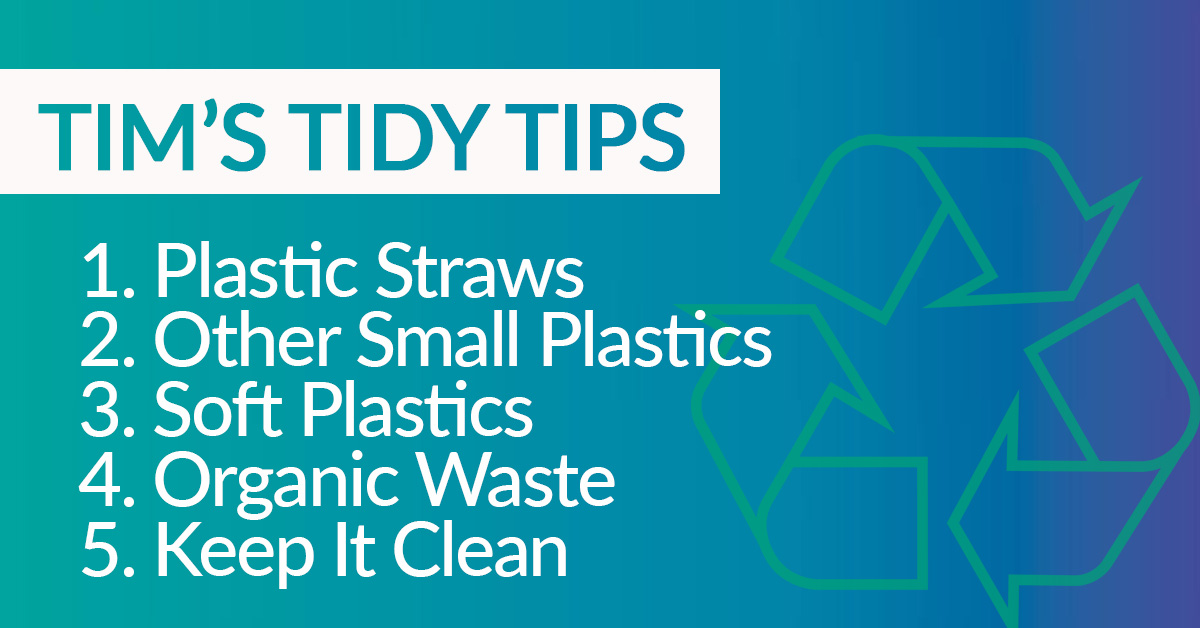
To celebrate the start of Keep Australia Beautiful (KAB) week, Lee Green Consultant Tim Major has shared with us five handy tips for recycling at home.
Plastic Straws: In the news a lot lately, these are easy to deal with in an environmentally friendly manner at home. Hold on to a plastic milk or juice container and keep it for all of your small plastics. Place your plastic straws in your dishwasher’s cutlery basket or give them a quick rinse when doing the nightly dishes. The rinsed straws can then be placed in the plastic container safe in the knowledge that there will be no aroma and nothing to attract ants or other ‘nasties’. You can also request no straw when ordering a drink out or purchase your own bamboo or stainless steel reusable straw.
Other Small Plastics: The problem with a small piece of plastic is that it does not have enough weight or surface area to allow it to move through the recycling facility with the larger plastic items, so it ends up on the floor and destined for land fill. An empty plastic milk or juice container can be used for any item that fits easily through the neck of the container, takeout style plastic containers can also be used. Separating lids from bottles is a must as they are usually made from different plastics and ALL lids must be removed in order to provide a safe working enironment for the recycling workers. Most of these lids will fit into your small plastics container, together with plastic straws and such items as expired plastic biro components, redundant small plastic toys and some types of empty medical dispensers.
Soft Plastics: most kerbside recycling services do NOT accept plastic bags and other soft plastics. These plastics cause problems in the recycling machinery so they need to be dealt with separately. The major supermarket chains provide collection points for these plastics and it is a very simple process of filling an empty plastic bag with all of your soft plastics and then taking this with you when you next go to the supermarket. The important issue here is that the plastic must be clean and dry, so the bag that your marinated chicken came in cannot be recycled. Soft plastics include bread bags, bubble-wrap, biscuit wrappers, chip packets and the bags used when you buy vegetables and fruit, to name just a few.
Organics Waste: is NOT just the product of activities in your garden! Certainly, your lawn clippings and garden prunings should always go through this system, but there are many other organic items generated inside the house. ALL food scraps (including bones, shells and skins) should end up in your organics waste. No plastic containers or wrapping, just the foody part. In addition, paper towels, paper tissues, paper napkins, plus any cardboard containers that have been ‘contaminated’ with food (such as pizza boxes) can all be placed in your organics bin. Pet waste also qualifies but check the manufacturers recommendations in regard to kitty litter and similar products, as many of these are not organic.
Keep it Clean!: One of the very early catch-phrases around recycling was “wash and squash”, which was aimed at making the recycled product easier to handle as it was clean and less bulky. The squash part is not as important now that ‘giant’ trucks collect the waste, though you may wish to break down cardboard boxes etc so they take up less room in your recycling bin. While traces of food on your recyclables will not interfere with the recycling process, The teaspoon or so of sauce left inside your ‘empty’ baked beans can will invariably end up oozing all over the newspaper and cardboard in the recycling bin in the interval between collections so empty out all the food scraps you can and give the container a quick rinse if necessary.
Hopefully, the processes outlined above are already in place at your home. If they are, well done, if not, please consider implementing some of these ideas into your daily routines so that more and more of our waste is redirected away from landfill.
A simple thought: 1 empty steel can weighs around 20gms. There are around 25,000,000 people in Australia. If each person recycled just ONE steel can each year, 500 TONNES of steel would be diverted away from landfill! Make that ONE steel can each DAY and the number becomes 182,500 TONNES, which is the equivalent of about 4 Titanics! Use the global population and the numbers are staggering.
YES, THAT ONE STEEL CAN DOES MATTER!








